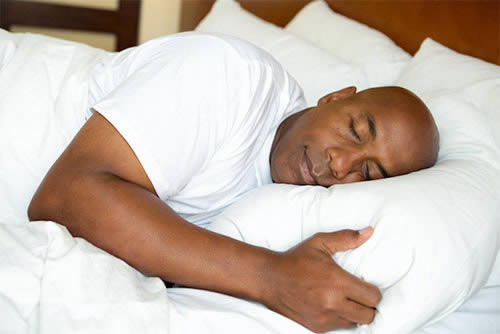Today, it is commonplace to hear someone say, “I slept horrible last night.” It becomes rare to have a great night’s sleep. Waking up a few times a night is something many of us accept as normal. But this is not normal, not at all.
There is a misconception in our society that certain happenings in our life and in regards to our health are normal. We believe it is normal to have a headache once a week. It is normal to have twinges of joint pain throughout the day. It is normal to crave sugar. It is normal to sleep badly. These occurrences are common, but not normal! While it may be common to have a headache or sleep badly, this is not your body functioning at a normal and healthy level. These are symptoms of disease and ill health building up within the body. These symptoms are uncomfortable and can keep you from doing the things you want or need to do throughout the day. That is not your body functioning normally, and definitely not optimally or ideally. And while there are things we can do, pills we can take, that can bring us back to feeling normal and symptom free, that does not fix the underlying causes of the symptoms. The disease and ill health are still there, bringing you further and further away from your body functioning at 100% of its potential.
Physical & Health Problems Related to a Lack of Sleep
- Weight gain. According to a report in USA Today, sleep deprived individuals routinely eat 300 more calories a day, and then to crave crabs and sugars.
- Automobile accidents. The U.S. Department of Transportation attributes 1,550 deaths and 40,000 injuries occur each year as the result of drowsiness.
- Accelerated aging
- Increased risk of cancer
- Weakened immune system
- Memory problems, and trouble making simple decisions.
- Disrupts the circadian rhythm at the cellular level
- High blood sugar levels (increased risk of diabetes)
- High blood pressure and hypertension
- Lack of sleep can further exacerbate many chronic and serious diseases such as Parkinson, Alzheimer, multiple sclerosis (MS), kidney disease, gastrointestinal disorders, and even behavioral problems in children. [The Journal of the American Medical Association]
- Clumsiness and poor motor control
- Slower healing from diseases or injuries
- Irritability and hypersensitivity
- Anxiety and Depression
Tips for a Good Nights Sleep
Our bodies need a good night’s sleep to recharge for the next day. Light, in particularly blue light, inhibits us from falling to sleep and getting deep rest. TVs, smart phones and iPads are some of the most common sources of blue lights in the bedroom. Apple has just added the ability to warm the color of the screen on iPhones and iPads. I recommend that you go into Settings > Display & Brightness > Night Shift; and schedule the night shift settings to start at least 2 hours before you typically go to bed. You can adjust the screen color temperature to a warmer, less blue, appearance. While Apple did this specifically because science warns against blue lights before sleep, it is even healthier to get in the habit of avoiding all electronic screens at least 1 hour before going to bed.

Here are some other tips.
- Create a proper environment for sleeping.
- Avoid watching TV or using your computer, tablet, video games, or smart phone for at least an hour prior to going to bed. They give off a lot of light in the blue spectrum that can suppress melatonin production and interfere with your sleep.
- Sleep in a dark environment. Your pineal gland produces melatonin and serotonin, and even the faintest bit of light can disrupt this and throw off your internal clock.
- Invest in blackout shades or drapes
- Close your bedroom door, and get rid of night-lights. Even something as faint as the light from an alarm clock could be interfering with your sleep.
- Sleep in a cool environment. When your body reaches stage 2 of the sleep cycle, your body temperature automatically lowers. Studies show the optimal temperature to be between 60 to 68°F. Warmer or cooler temperatures can lead to a restless sleep.
- If you need background noise to help you sleep, get an alarm clock with white noise built in, or a white noise machine
- SLEEPING TIP: Remove the TV from the bedroom, particularly from the bedroom of your children. Watching TV can disrupt their sleep. No TV, no temptation.
- Get Chiropractic Adjustments. 7-8 out of 10 of our patients tell us that after their initial chiropractic adjustments they fall to sleep quicker and have deeper, more restful sleep.
- Exercise. Daily exercise not only gives you more energy during the day and helps maintain a proper weight — it also help you sleep better. Avoid exercising right before going to bed since your increased heart rate could interfere with getting to sleep.
- Avoid caffeine, particularly in the afternoon and evenings.
- Develop a healthy sleep routine. A set routine works. Try to be asleep by 11:00 p.m., your body, particularly your adrenal glands, does most of its recovering and recharging between 11:00 p.m. and 1:00 a.m.
- Use the time before going to bed to wind down, relax, meditate, sip an herbal tea, read something spiritual (the print version, not digital), or wash your face and brush your teeth.
- PARENTAL TIP: Turn off the WiFi network an hour before bedtime.
- Make sure your mattress and pillow are supportive, but not too firm. In particular, make sure your pillow is not pushing your chin into your chest or bending your neck to an angle different from its natural curve. Not only could you wake up with a sore neck, but this could lead to snoring and other disruptions of your sleep. Talk to your chiropractor about positioning your pillow properly to support your neck. There are even specially designed pillows to help properly support your neck while you sleep.
Chiropractic Care Can Help You Sleep Better
There is nothing more dissatisfying than heading to bed after an exhausting day and being unable to fall asleep, or waking up and still feeling tired. But chiropractic can help! One of the most common things patients tell us after their first adjustment is that they sleep exceptionally well, and that throughout their care, they sleep better and better. If you have having trouble sleeping, it could very well be from a spinal misalignment, putting pressure on your nerves and not allowing your body to relax properly for a good nights rest. Give chiropractic a try; what could it hurt? Give yourself and your body the chance to express its full potential. Do not allow yourself to be caught up in what is perceived as normal, when you do not have to live that way! Call our office at 804-740-3434 to schedule your first adjustment today!

